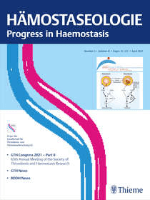
Hamostaseologie
Scope & Guideline
Pioneering Research in Coagulation: Your Gateway to Hematological Insights
Introduction
Aims and Scopes
- Clinical Management of Hemostasis and Thrombosis:
The journal covers various aspects of clinical management, including guidelines and recommendations for treating patients with bleeding disorders, thrombosis, and other related conditions. - Research on Coagulation Mechanisms:
It provides insights into the underlying biological processes involved in coagulation and thrombosis, including studies on platelet function, clotting factors, and the impact of genetic mutations. - Innovative Therapeutic Approaches:
The journal highlights novel therapies, such as gene therapy, direct oral anticoagulants (DOACs), and other emerging treatment options for various hemostatic disorders. - Patient-Centric Studies:
Research that emphasizes the patient experience, including management strategies for specific populations (e.g., pediatric patients, cancer patients) and their unique needs in hemostasis and thrombosis. - Public Health and Policy in Hemostasis:
The journal addresses public health concerns, including the implications of hemostatic disorders on healthcare systems and policies, as well as guidelines for practice in different healthcare settings.
Trending and Emerging
- Cancer-Associated Thrombosis:
Research focusing on the relationship between cancer and thromboembolic events is on the rise, highlighting the need for specialized management strategies for this vulnerable population. - Personalized Medicine Approaches:
There is a growing emphasis on individualized therapy, particularly in the context of hemophilia and other bleeding disorders, as seen in studies exploring tailored treatment regimens based on patient-specific factors. - Impact of COVID-19 on Hemostasis:
The pandemic has spurred increased research into the effects of COVID-19 on coagulation pathways and thromboembolic complications, marking a significant shift in research priorities. - Integration of Technology in Management:
Emerging themes include the use of digital health solutions and innovative technologies for monitoring and managing hemostatic disorders, reflecting the ongoing digital transformation in healthcare. - Gene Therapy and Novel Anticoagulants:
There is a notable trend towards exploring gene therapy and new anticoagulant agents as potential game-changers in the treatment landscape for hemophilia and thrombosis.
Declining or Waning
- Traditional Laboratory Diagnostics:
There has been a noticeable decrease in papers focused on traditional diagnostic methods for coagulation disorders, likely due to the advent of more advanced and efficient testing technologies that have overshadowed older approaches. - Historical Treatments and Practices:
Topics related to older treatment modalities, such as traditional anticoagulants or outdated surgical techniques, have become less frequent as newer, evidence-based practices gain prominence in the literature. - Basic Research on Non-Hemostatic Disorders:
Research that broadly intersects with hemostasis but focuses less on direct implications for thrombosis or bleeding disorders has decreased, as the journal shifts towards more clinically relevant studies.
Similar Journals
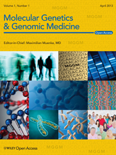
Molecular Genetics & Genomic Medicine
Bridging research and real-world medical solutions.Molecular Genetics & Genomic Medicine, published by WILEY, is an esteemed and open-access journal that has been a prominent source of knowledge in the fields of genetics and molecular biology since its establishment in 2013. With an ISSN of 2324-9269, it aims to provide a platform for the dissemination of novel findings and innovative research that pushes the boundaries of genomics and its clinical applications. The journal holds a Q3 categorization in Genetics, Clinical Genetics, and Molecular Biology, reflecting its growing influence in these disciplines, as evidenced by its Scopus rankings. Researchers, professionals, and students alike will find valuable insights and advancements in genomic medicine, making this journal an essential resource for those dedicated to the understanding and application of genetic and molecular research in healthcare. Located at 111 River St, Hoboken, NJ, Molecular Genetics & Genomic Medicine continues to foster a global dialogue within the scientific community, ensuring accessible knowledge for all.

BLOOD REVIEWS
Exploring breakthroughs in hematologic and oncologic research.BLOOD REVIEWS is a highly regarded journal published by Churchill Livingstone, specializing in the fields of Hematology and Oncology. With an impressive Q1 ranking in both disciplines and placing in the top 10% of its peer categories according to Scopus metrics, it provides an essential platform for the dissemination of cutting-edge research and reviews pertaining to blood disorders and cancer treatment. Since its inception in 1987 and continuing through 2024, the journal has established itself as a cornerstone for healthcare professionals, researchers, and students who seek to advance their understanding of hematologic and oncologic topics. While not an open-access journal, BLOOD REVIEWS retains a reputation for delivering high-quality, peer-reviewed articles that foster dialogue and innovation within the scientific community. For those in the United States and beyond, the journal serves as a vital resource, housed at the Journal Production Department in Edinburgh, Scotland, ensuring accessibility and a global reach in its critical academic contributions.
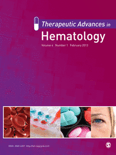
Therapeutic Advances in Hematology
Empowering hematology professionals with cutting-edge findings.Therapeutic Advances in Hematology is a prestigious, peer-reviewed journal dedicated to advancing the field of hematology through innovative research and clinical studies. Published by SAGE Publications Ltd, this journal has become a vital resource for hematology professionals and researchers since its inception in 2010. With its impactful Q1 ranking in Hematology and a Scopus rank of 62 out of 137, it firmly establishes itself as a leader in disseminating significant findings and therapeutic approaches. The journal has been committed to open access since 2019, ensuring that its cutting-edge research is readily available to the global scientific community. Covering a broad scope of topics within hematology, Therapeutic Advances in Hematology is an essential platform for those seeking to enhance their understanding and implementation of therapeutic practices in hematological conditions. The journal embraces submissions from both clinical and laboratory perspectives, fostering collaboration and dialogue among researchers, clinicians, and students alike.
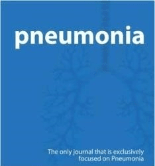
Pneumonia
Empowering Healthcare through Rigorous ResearchPneumonia is an esteemed open-access journal published by BMC, focusing on a comprehensive range of topics related to pneumonia and respiratory diseases. Since its inception in 2012, the journal has been dedicated to disseminating high-quality research that advances scientific understanding and clinical practices in the field. With an ISSN of 2200-6133, this journal provides researchers, healthcare professionals, and students with immediate access to groundbreaking studies, systematic reviews, and clinical guidelines that address the global challenges posed by pneumonia. By facilitating the open exchange of knowledge, Pneumonia significantly contributes to the enhancement of patient care and the development of effective treatment strategies. Situated in the heart of London, Pneumonia harnesses the strengths of the BMC platform to maintain high academic standards and reach a diverse international audience.
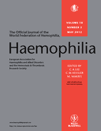
HAEMOPHILIA
Elevating standards in medical research and care.HAEMOPHILIA is a leading peer-reviewed journal published by Wiley, dedicated to advancing research and clinical practices in the fields of hematology and genetics. With an impressive Impact Factor and recognition within the Q1 category for Genetics (clinical), Hematology, and Medicine (miscellaneous), this journal presents a unique platform for the dissemination of high-quality research from 1995 to the present. Researchers in these dynamic fields will find invaluable insights through original articles, systematic reviews, and clinical trials, all aimed at improving therapeutic strategies and patient outcomes. Although it operates on a subscription basis, HAEMOPHILIA's commitment to excellence is reflected in its Scopus rankings, where it stands in the 74th percentile for hematology and the 71st percentile for clinical genetics. As an essential resource for academics, healthcare professionals, and students, HAEMOPHILIA plays a pivotal role in fostering innovation and collaboration within the global medical community.
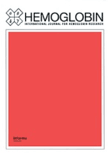
HEMOGLOBIN
Exploring innovative insights in biochemistry and genetics.HEMOGLOBIN, a prominent journal published by Taylor & Francis Ltd, serves as a vital resource in the fields of Biochemistry, Clinical Biochemistry, Genetics, and Hematology. Established in 1976, the journal provides a platform for innovative research and review articles that explore the complexities of hemoglobin pathology and related disorders, making significant contributions to our understanding of hematological diseases. With an ISSN of 0363-0269 and an E-ISSN of 1532-432X, HEMOGLOBIN has garnered attention within the academic community, reflected in its category quartiles for 2023, which rank it in the Q3 and Q4 levels across relevant medical and biochemistry categories. Although it operates on a subscription basis rather than as an open-access journal, it remains influential, providing critical insights to researchers, professionals, and students aiming to address the current challenges in blood research and related fields. The journal not only emphasizes high-quality scientific analyses but also seeks to foster collaboration and dialogue among academia and clinical practitioners, ultimately advancing the frontier of knowledge in hemoglobin and hematological research.

Research and Practice in Thrombosis and Haemostasis
Innovating hematology through open-access insights.Research and Practice in Thrombosis and Haemostasis, published by Elsevier, is a prominent open-access journal dedicated to advancing the field of hematology through high-quality research and clinical practice. Since its inception in 2017, this journal has established itself as a vital resource for researchers, healthcare professionals, and students interested in thrombosis and hemorrhage management, showcasing original research, reviews, and clinical studies. The journal’s commitment to accessible knowledge is reflected in its open-access model, allowing researchers worldwide to share their findings without financial barriers. With an impressive 2023 Scopus rank of #42 out of 137 in the hematology category and a respectable Q2 classification, it provides an authoritative platform for innovative ideas and cutting-edge developments in the field. As the journal continues to grow in stature, it aims to foster collaboration and knowledge exchange amongst professionals dedicated to improving patient outcomes in thrombosis and hemostasis.
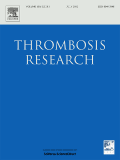
THROMBOSIS RESEARCH
Leading the Charge in Blood Disorder StudiesTHROMBOSIS RESEARCH is a leading peer-reviewed journal in the field of hematology, published by PERGAMON-ELSEVIER SCIENCE LTD. With an impressive impact factor and ranked within the top 10 of 137 in its category according to Scopus, this journal provides a critical platform for the dissemination of innovative research related to thrombosis and hemostasis. Established in 1972, THROMBOSIS RESEARCH has been at the forefront of scholarly communication, addressing key issues, findings, and advancements over more than five decades. Recognized for its high-quality content, the journal is categorized in the Q1 quartile for 2023, reflecting its influence and relevance within the scientific community. Researchers, medical professionals, and students engaged in the study of blood disorders will find valuable insights and the latest discoveries within its pages. Although currently not an open-access publication, THROMBOSIS RESEARCH remains accessible to a wide audience through institutional subscriptions, ensuring that vital research continues to inform and enhance clinical practices around the globe.
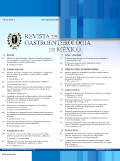
Revista de Gastroenterologia de Mexico
Connecting Professionals Through Cutting-Edge ResearchRevista de Gastroenterologia de Mexico, published by Elsevier, serves as a vital platform for advancing knowledge in the field of gastroenterology. Established in Mexico, this esteemed journal boasts an open access format since 2012, promoting widespread dissemination of research findings and enhancing access for healthcare professionals and researchers worldwide. With its impact factor reflecting a growing recognition in the academic community, the journal is currently ranked in the Q3 category for Gastroenterology, indicating its relevance and contribution to the field. Spanning decades of publication history from 1947 to the present, it offers a wealth of medical insights and serves as a critical resource for those engaged in clinical practice and research. The journal aims to publish high-quality original research, reviews, and clinical studies, making it an essential resource for professionals seeking to stay at the forefront of gastroenterological advancements. Located at Radarweg 29, 1043 NX Amsterdam, Netherlands, the journal embraces a holistic approach to gastroenterology, encouraging contributions that enrich the understanding and treatment of gastrointestinal disorders.
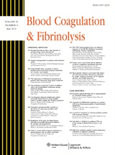
BLOOD COAGULATION & FIBRINOLYSIS
Illuminating the Pathways of Coagulation and FibrinolysisBLOOD COAGULATION & FIBRINOLYSIS, a distinguished journal in the field of hematology, is published by Lippincott Williams & Wilkins, a reputable name in academic publishing. Since its inception in 1990, this journal has been committed to advancing the understanding of blood coagulation and fibrinolysis, focusing on the molecular mechanisms, clinical implications, and therapeutic aspects of these critical processes. With an impact factor reflecting its significance within the academic community, currently ranking Q3 in both Hematology and Miscellaneous Medicine for 2023, this journal serves as a pivotal platform for researchers and professionals alike. By providing access to cutting-edge research and reviews, BLOOD COAGULATION & FIBRINOLYSIS endeavors to foster collaboration and innovation in the treatment of coagulation disorders. Interested readers can explore ongoing contributions to the field through subscriptions and institutional access options.